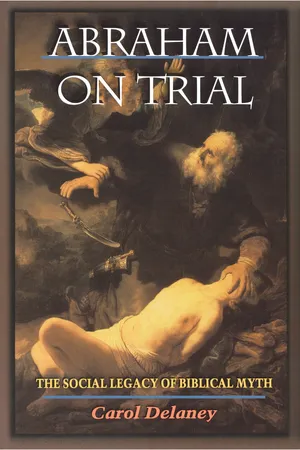
- English
- PDF
- Available on iOS & Android
About this book
Abraham on Trial questions the foundations of faith that have made a virtue out of the willingness to sacrifice a child. Through his desire to obey God at all costs, even if it meant sacrificing his son, Abraham became the definitive model of faith for the major world religions of Judaism, Christianity, and Islam. In this bold look at the legacy of this biblical and qur'anic story, Carol Delaney explores how the sacrifice rather than the protection of children became the focus of faith, to the point where the abuse and betrayal of children has today become widespread and sometimes institutionalized. Her strikingly original analysis also offers a new perspective on what unites and divides the peoples of the sibling religions derived from Abraham and, implicitly, a way to overcome the increasing violence among them.
Delaney critically examines evidence from Jewish, Christian, and Muslim interpretations, from archaeology and Freudian theory, as well as a recent trial in which a father sacrificed his child in obedience to God's voice, and shows how the meaning of Abraham's story is bound up with a specific notion of fatherhood. The preeminence of the father (which is part of the meaning of the name Abraham) comes from the still operative theory of procreation in which men transmit life by means of their "seed," an image that encapsulates the generative, creative power that symbolically allies men with God. The communities of faith argue interminably about who is the true seed of Abraham, who can claim the patrimony, but until now, no one has asked what is this seed.
Kinship and origin myths, the cultural construction of fatherhood and motherhood, suspicions of actual child sacrifices in ancient times, and a revisiting of Freud's Oedipus complex all contribute to Delaney's remarkably rich discussion. She shows how the story of Abraham legitimates a hierarchical structure of authority, a specific form of family, definitions of gender, and the value of obedience that have become the bedrock of society. The question she leaves us with is whether we should perpetuate this story and the lessons it teaches.
Frequently asked questions
- Essential is ideal for learners and professionals who enjoy exploring a wide range of subjects. Access the Essential Library with 800,000+ trusted titles and best-sellers across business, personal growth, and the humanities. Includes unlimited reading time and Standard Read Aloud voice.
- Complete: Perfect for advanced learners and researchers needing full, unrestricted access. Unlock 1.4M+ books across hundreds of subjects, including academic and specialized titles. The Complete Plan also includes advanced features like Premium Read Aloud and Research Assistant.
Please note we cannot support devices running on iOS 13 and Android 7 or earlier. Learn more about using the app.
Information
Table of contents
- Cover page
- Half-title page
- Title page
- Copyright page
- Dedication page
- Contents
- List of Illustrations
- Acknowledgments
- Introduction
- Part One: Abraham On Trial
- Part Two: Archaeological And Biblical Evidence
- Part Three: Religious Defenses And Their Silences
- Part Four: The Testimony Of Psychoanalysis
- Part Five: The Social Legacy
- Notes
- Select Bibliography
- Index